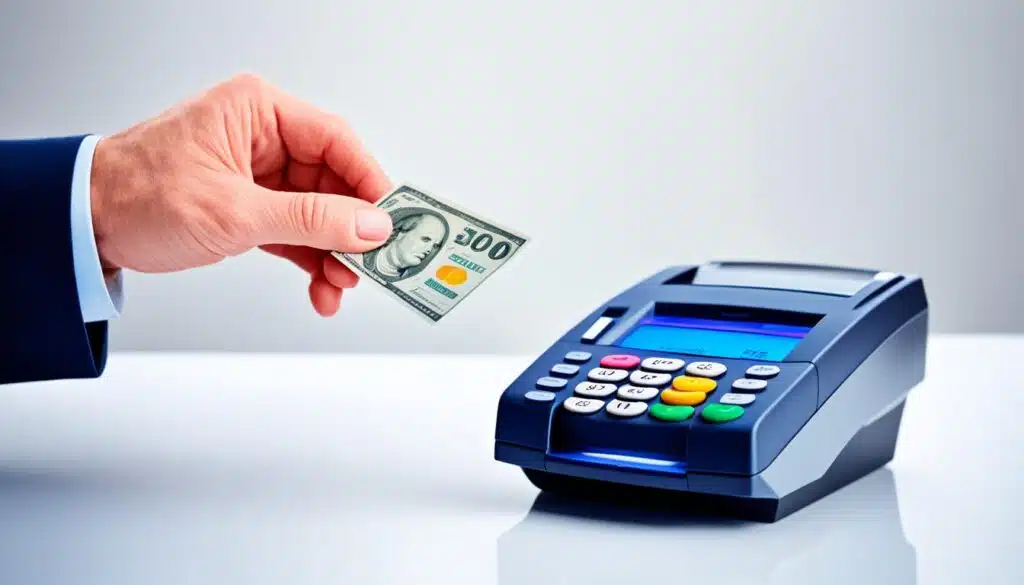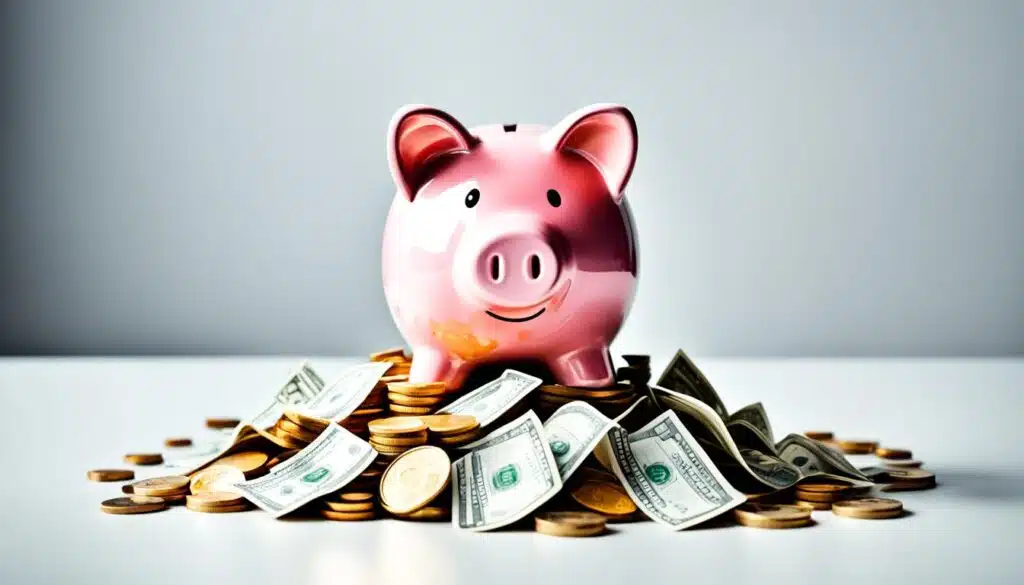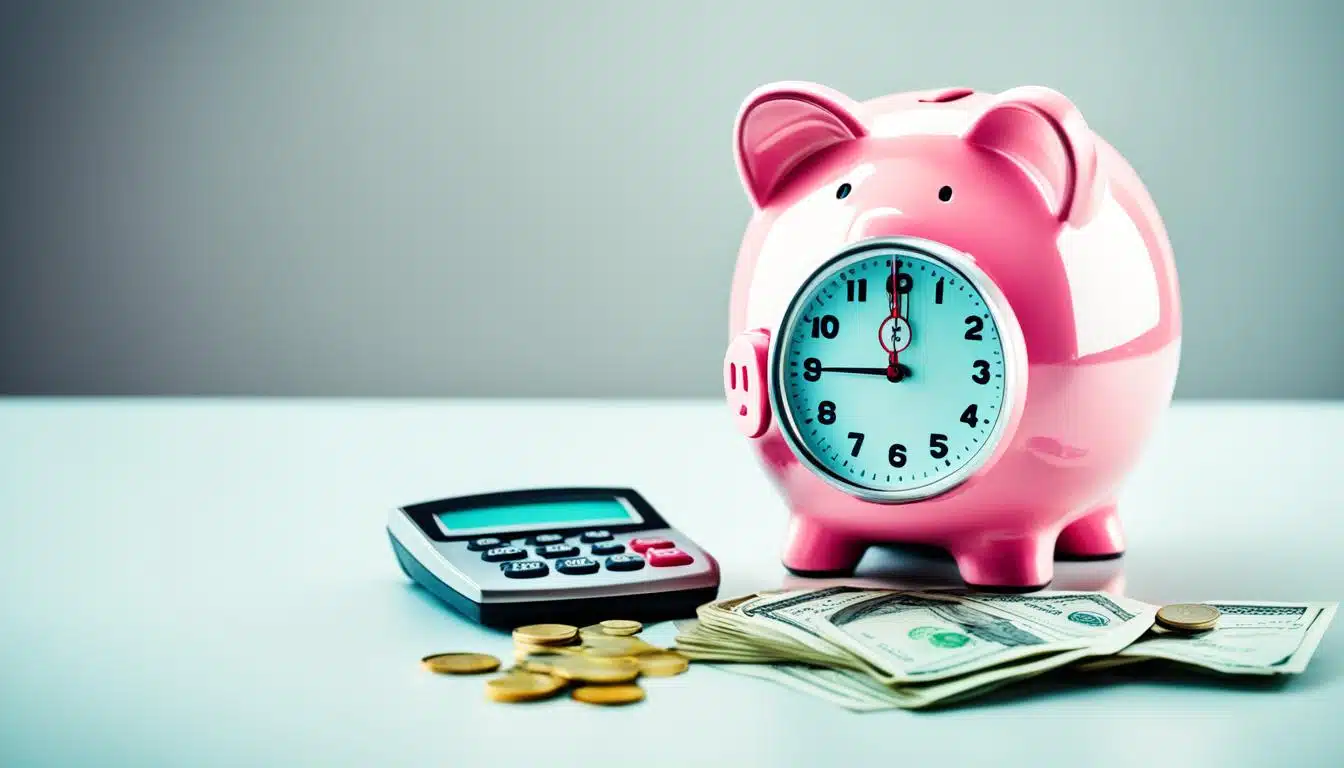Juggling multiple loans can feel overwhelming. But, the right strategies can put you in charge. You can pay off your loans quicker, cut interest costs, and reach financial freedom. This guide delves into proven ways to help you accelerate loan payments.
It covers understanding debt consolidation benefits and using tax refunds. It also looks into loan forgiveness programs. These tips will help you efficiently manage and pay off different loans. So, whether you have personal loans or federal student loans, these strategies can guide you. They will help in reaching your financial objectives.
Key Takeaways
- Explore the advantages and drawbacks of debt consolidation to simplify your repayment process.
- Understand the importance of making payments during grace periods to reduce interest costs.
- Enroll in automatic debit to potentially earn an interest rate reduction and ensure timely payments.
- Allocate extra payments strategically to pay off your loans faster and reduce the total interest paid.
- Utilize tax refunds to make lump-sum payments and accelerate your loan payoff timeline.
Understanding Debt Consolidation
Debt consolidation is about combining various debts into one. This could be personal loans, student loans, or credit card balances. By doing this, you’re getting a new loan that usually has a lower interest rate. It makes paying back simpler, reduces interest, and keeps your monthly costs in check.
What is Debt Consolidation?
It’s the act of getting one new loan to clear lots of your current debts. The aim is to get a lower interest rate and have only one payment to worry about each month. People with different debts and interest rates find this method helpful.
Benefits of Consolidating Debt
Consolidating your debt into one loan has its perks. You get:
- A single monthly payment, making things easier to manage
- The chance of a lower interest rate, which could cut costs
- Better credit scores by managing debts differently
- A quicker way to pay off what you owe with a shorter payment term
Drawbacks of Debt Consolidation
Still, there are things to watch out for, such as:
- A new loan might stretch over more years, increasing total interest
- It just combines debts, not reduces them
- Debt consolidation can have extra fees to think about
- Failing to pay could hurt your credit badly
Seeing both the good and bad of debt consolidation lets you make a smart choice. It’s key to carefully consider your financial position before deciding.
Making Payments During Grace Periods
The grace period for loans is key for borrowers. It’s the time after getting a loan but before the first payment is due. Many see it as a time to relax. But, wise borrowers use this time to make payments.
Even though you don’t have to pay anything yet, putting money towards the loan early can cut costs. This especially helps with federal student loans. Interest keeps adding up during the grace period. So, by making payments now, borrowers can reduce what they’ll owe in the long run.
For those who can afford it, starting payments early is a great move. It lets borrowers finish paying the loan quicker. It also means they’ll owe less. On top of that, it shows lenders that they’re responsible with money. This can boost their credit score.
Enrolling in Automatic Debit

Looking to pay off loans faster? Try automatic debit. It’s an easy way to get ahead. It could give you a 0.25% interest rate reduction on your loans, too.
Interest Rate Reduction Benefit
When you sign up for automatic payments, many lenders will lower your interest rate. This makes your loan cost less in the long run. Make sure to check with your loan servicer to see if you can get this benefit. Set up automatic debit with them.
Ensuring Timely Payments
Setting up automatic debit means your payments are always on time. This can help keep your credit score good. Plus, you’ll avoid late charges. Automating your payments is a smart move. It helps you manage your debt better and become more financially stable.
Making Extra Payments
The article highlights how crucial it is to make extra loan payments when you can. By putting more towards the principal, you cut down on total interest and clear the debt faster.
Allocating Extra Payments
It’s wise for borrowers to confirm with their loan provider about extra payments. They should aim to address higher-interest loans first. Even small additional payments can alter the loan’s overall cost and time to pay off.
Reducing Total Interest Paid
Extra payments on the principal can vastly decrease the loan’s total interest. This approach speeds up the debt repayment and saves a lot in the long term.
Utilizing Tax Refunds

One effective strategy to pay off loans faster is using your tax refunds. You might get a tax deduction on the interest from your student loans or personal loans. By using part of your tax refund to make extra loan payments, you can speed up your loan repayment. This method helps lower the total interest you pay over time.
When you get a tax refund, think about putting that money toward paying off the main amount of your loans. This choice can speed up how fast you finish paying those loans and it saves you money. Even using a little bit of your refund on your loans can benefit you greatly.
Using your tax refund wisely is a smart way to work on getting out of debt. By carefully using this extra money, you can cut down on interest charges subsidized and unsubsidized loans. This means you’ll pay less money back over time for your loans.
Exploring Loan Forgiveness Programs

Are you struggling to repay your loans? You might find help through loan forgiveness programs. These programs speed up loan payoffs or wipe your loan clean. We will talk about Teacher Loan Forgiveness, Public Service Loan Forgiveness, and Military Loan Repayment Programs rates and terms are subject.
Teacher Loan Forgiveness
If you’re an educator, the Teacher Loan Forgiveness program could be your answer. By teaching full-time for five years at a low-income school, you could see part of your loan forgiven. You might get up to $17,500 off your loan, depending on what you teach.
Public Service Loan Forgiveness
The Public Service Loan Forgiveness (PSLF) program helps those in public service jobs. If you make 120 monthly payments while working for the government, military, or in public healthcare, you might get your remaining loan balance forgiven. It’s a big help for many people.
Military Loan Repayment Programs
Members of the military can explore loan forgiveness through the Department of Defense. This includes help with paying off loans or total loan forgiveness for your service. Be sure to look into the details of these military-specific loan forgiveness plans.
Looking into these forgiveness programs could change the game for you. They could help you pay off your loans quicker and take a big financial weight off your shoulders. Understanding if you qualify and using these programs could make reaching your loan payment goals easier.
Also Read : What Is Debt Consolidation And How Does It Work?
Loans: Faster Payoff Strategies
There are more ways to pay off loans quicker. You can make bi-weekly payments or use lump sums. Also, consider a side gig for extra cash complete your education. These methods cut down interest and pay off the loan faster.
Making Bi-Weekly Payments
Making payments every two weeks helps. It’s better than just monthly. This way, you’re paying half the usual amount more frequently. So, by year’s end, you’ve paid an extra month. This method shaves time off and lessens what you owe.
Applying Lump Sum Payments
If you get a big sum like a tax refund, think about your loan. Putting this amount straight onto your loan does wonders. It cuts down on what you’ll pay in interest loan program. But remember, talk to your lender to ensure it’s handled correctly.
Getting a Side Gig
A side job can jumpstart your loan payoff. This extra money can beef up your monthly payments or lower your principal. It can even cover the whole monthly amount. This lets your main income focus on other financial needs.
FAQs
Q: What are some common types of loans that can be paid off faster?
A: Some common types of loans that can be paid off faster include student loans, personal loans, direct loans, and federal loans 2024.
Q: How can I pay off my loans faster?
A: You can pay off your loans faster by making larger monthly payments, applying any extra money towards your principal balance, and considering refinancing or consolidating your origination loans.
Q: How do loan interest rates impact paying off loans faster?
A: Lower loan interest rates can help you save money on interest payments and pay off your loans faster, while higher interest rates can make it more challenging to pay off your loans quickly origination fee.
Q: What is the importance of knowing your loan eligibility?
A: Knowing your loan eligibility helps you understand what loan options are available to you, how much you can borrow, and what terms you may qualify for when paying off your loans faster.
Q: Can borrowing more money than needed affect paying off loans faster?
A: Yes, borrowing more money than needed can increase your total loan amount and monthly payments, making it harder to pay off your loans faster.
Q: How does loan consolidation help in paying off loans faster?
A: Loan consolidation can streamline your debt by combining multiple loans into one, potentially lowering your monthly payments and interest rates, making it easier to pay off your loans faster.
Q: Are there any strategies for paying off loans faster that can impact my credit score?
A: Yes, making on-time payments and paying off your loans faster can positively impact your credit score, showing responsible financial behavior to creditors.





